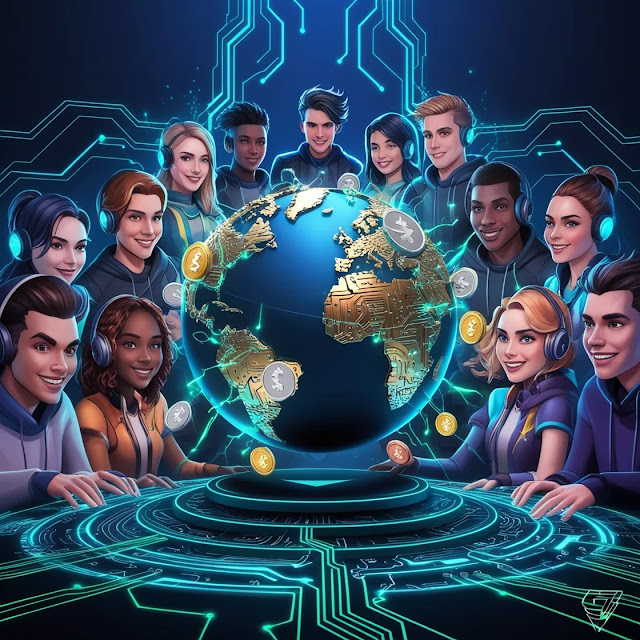Blockchain in Online Gaming and Virtual Economies
Blockchain technology is revolutionizing various industries, and online gaming is no exception. As virtual economies grow more complex, the integration of blockchain offers a transparent, secure, and decentralized approach that benefits both gamers and developers. This article delves into how blockchain is transforming online gaming and virtual economies, from enhancing digital ownership to fostering new economic models.
 |
| Blockchain in Online Gaming and Virtual Economies |
The Role of Blockchain in Online Gaming
Blockchain technology plays a significant role in reshaping the online gaming landscape. It provides a decentralized platform where game developers can create and manage in-game assets securely. Unlike traditional gaming systems where ownership of digital items is often limited to the platform, blockchain allows true ownership and transferability of assets. This transparency ensures that all transactions within the game are secure and verifiable, making it a game-changer in the online gaming industry.
Benefits of Blockchain in Virtual Economies
The integration of blockchain in virtual economies brings several benefits. Firstly, it enhances transparency and security, ensuring that all transactions are recorded on a public ledger. This reduces the risk of fraud and manipulation, which is crucial in environments where in-game assets can have real-world value. Secondly, blockchain enables the creation of decentralized marketplaces, where players can trade digital assets without the need for intermediaries. This not only empowers players but also fosters a more open and competitive market. Additionally, blockchain facilitates the development of play-to-earn models, where players can earn cryptocurrency through their in-game activities, further blurring the line between virtual and real-world economies.
Challenges and Limitations of Blockchain in Gaming
While blockchain technology offers numerous advantages, it also faces challenges and limitations in the gaming industry. One of the primary concerns is scalability. Current blockchain networks can struggle to handle the high volume of transactions generated by popular online games, leading to slow transaction times and increased fees. Another challenge is the complexity of blockchain technology, which can be a barrier to entry for both developers and players who are not familiar with the system. Moreover, there is the issue of energy consumption, as blockchain networks, particularly those using proof-of-work consensus mechanisms, can be energy-intensive. These challenges need to be addressed for blockchain to fully realize its potential in online gaming.
Future Trends: Blockchain and Virtual Economies
The future of blockchain in online gaming and virtual economies looks promising. As technology advances, we can expect to see more scalable and energy-efficient blockchain solutions that address current limitations. The rise of non-fungible tokens (NFTs) is another trend that will likely continue to grow, providing players with unique digital assets that can be traded or sold on various platforms. Additionally, the concept of the metaverse—a collective virtual shared space—will likely become more prevalent, with blockchain serving as the backbone for these interconnected virtual worlds. As these trends evolve, blockchain will play an increasingly central role in shaping the future of online gaming and virtual economies.
How Blockchain Enhances Digital Ownership
Blockchain enhances digital ownership by providing a secure and transparent way to manage digital assets. In traditional online games, players often do not have true ownership of their in-game items; instead, these assets are controlled by the game developers. Blockchain changes this dynamic by allowing players to truly own their digital assets, which are stored on a blockchain and can be traded or transferred independently of the game. This level of ownership is particularly important in virtual economies, where in-game assets can have significant real-world value. By ensuring that digital assets are secure and transferable, blockchain empowers players and creates new opportunities for economic activity within virtual environments.
Questions & Answers
How does blockchain impact game development?
Blockchain impacts game development by offering new tools and platforms for creating decentralized games. Developers can use blockchain to build games with secure in-game economies and create digital assets that players can truly own and trade. This opens up new possibilities for game design and monetization.
What are non-fungible tokens (NFTs) in gaming?
Non-fungible tokens (NFTs) are unique digital assets that represent ownership of specific items or content within a game. Unlike traditional in-game items, NFTs are stored on a blockchain, which allows them to be traded or sold outside of the game. This gives players more control over their assets and creates new economic opportunities.
Can blockchain reduce fraud in online gaming?
Yes, blockchain can significantly reduce fraud in online gaming by providing a transparent and immutable ledger of all transactions. This makes it difficult for malicious actors to manipulate in-game economies or create counterfeit items, ensuring a fairer gaming experience for all players.
What role does blockchain play in the metaverse?
Blockchain plays a crucial role in the development of the metaverse by providing the infrastructure for secure and interoperable virtual worlds. It allows for the creation of decentralized virtual spaces where players can own and trade digital assets across different platforms, contributing to the growth of a unified virtual economy.
How does blockchain affect player privacy?
Blockchain can enhance player privacy by allowing for decentralized identity management and anonymous transactions. Players can participate in games without revealing their personal information, reducing the risk of data breaches and enhancing their overall gaming experience.
Conclusion
Blockchain technology is poised to revolutionize online gaming and virtual economies by offering enhanced security, transparency, and ownership of digital assets. While there are challenges to overcome, the potential benefits of blockchain in gaming are significant, from creating new economic models to empowering players with true ownership of their digital assets. As the technology continues to evolve, we can expect to see even greater integration of blockchain in online gaming, paving the way for a more decentralized and player-driven gaming experience.





